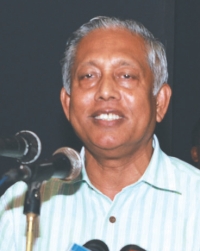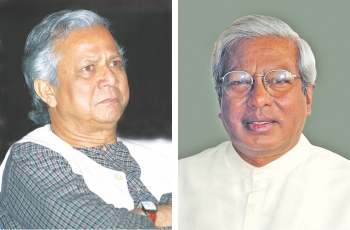| Home - Back Issues - The Team - Contact Us |
 |
| Volume 11 |Issue 20| May 18, 2012 | |
|
|
Current Affairs The Endgame Diverting people's attention from a burning issue might give the government some temporary respite, but it will have to pay heavily in the long run Shakhawat Liton European Union envoys, at a press conference in the capital on May 9, have said that Bangladesh's image abroad faces a serious crisis because of political violence, hartals, corruption and disappearances. Such unwarranted incidents, in view of the diplomats, give a negative signal to the outside world and discourage foreign investments in Bangladesh despite its huge potential. The EU diplomats have also stressed the need for a dialogue between major parties to end disagreements regarding holding the next general election in a free and fair manner.
Before the EU envoys have voiced their concern, visiting US Secretary of State Hillary Clinton, Indian Finance Minister Pranab Mukherjee and Japanese Deputy Prime Minister (DPM) Katsuya Okada strongly spoke about the issues of corruption, political violence, forced disappearances and human rights violation, etc. It has been perceived that the issues raised by the visiting dignitaries and the EU diplomats will dominate the country's politics for at least some days. People aware of politics and governance want politicians to hold constructive debates on the issues, as a dialogue between the ruling and opposition parties is crucial. But the entire political landscape have suddenly taken a different turn as some ministers—Finance Minister AMA Muhith, LGRD Minister Syed Ashraful Islam and Industries Minister Dilip Barua – have mercilessly attacked Prof Muhammad Yunus and Sir Fazle Hasan Abed. What have these two iconic figures done to deserve such attacks? At a meeting with Hillary, they spoke in favour of the restoration of the caretaker government system to peacefully hold the next parliamentary polls. Muhith and Ashraf also castigated Hillary for her remarks on Grameen Bank. Was the bashing of the country's two iconic characters by three senior ministers pre-planned or did it happen spontaneously? The ministers know the answer. But what is evident from their words is that the government has successfully diverted people's attention from issues as crucial as corruption, hartals, and holding political dialogue. Civil society leaders, professionals are politicians are now reacting to the ministers' diatribe against Yunus and Abed. Media is also running reports on the exchange of words. Some other important incidents took place in recent times. Former railway minister Suranjit's Sengupta's personal aide and a top railway official were caught in the middle of the night with a sack full of money, giving birth to a storm in politics. Suranjit resigned, but he was made a minister without portfolio as his resignation was not ''accepted''. It sparked a constitutional debate. People's attention was again diverted when BNP leader Ilias Ali went missing. The BNP enforced dawn to dusk hartals for five days. The government began crackdown on the senior BNP leaders. So, the Suranjit issue gradually went out of the public radar the way the World Bank's allegation of grafts in Padma bridge project was made to disappear from people's mind by some other incidents. But can the government really hide or ignore the reality by diverting people's attention? The observations made by the EU and the visiting dignitaries are indeed significant and none of us can deny the facts. Who are responsible for tarnishing the country's image abroad? The perverted political culture encourages the government to hold the opposition parties responsible for tarnishing the country's image. The previous governments were benefited by the unhealthy politics of their time and the incumbent one is also following suit by shifting the entire blame on the shoulder of opposition parties. Who are now engaged in corruption— ruling party men or opposition's activists? Are mass people involved in corruption? Or it is the public servants who are making money through corrupt means? The answer is not difficult to find– the government follows a go– soft policy regarding corruption. It remains silent against these incidents as ruling party men, government officials, and even some ministers and MPs are allegedly involved in corruption. The ruling Awami League's electoral pledges' to take stern measures against corruption did not see the light of the day over the last three years. It can easily be concluded that if the country's image faces a crisis abroad due to corruption, the government is wholly responsible for it. The incidents of forced disappearances have been seen by many as an epidemic, exposing the failure of the governance system, making a mockery of the rule of law. Are the opposition men behind every enforced disappearance? If the opposition is involved in them, what's the role of the government and its law enforcement agencies? Are the law enforcement agencies' able to decode the mystery of any single enforced disappearance? Or have they found any involvement of the opposition men in any incident? The government in no way can hide its failure to stop the menace, for which Bangladesh's image faces a crisis abroad.
For political violence and hartals, both the ruling and opposition parties are responsible. But they cannot be held equally responsible for it. The ruling party and the government must shoulder the maximum responsibilities for the growing political unrest. Many actions of the government, particularly the one for scrapping the caretaker government system in June last year, invited the opposition parties to wage street agitations. Law enforcement agencies were also seen taking tough actions against the opposition men in the past few months. The opposition countered the law enforcement agencies by torching vehicles or damaging public properties. And the politics may turn more violent in the coming days, centering on the issue of the caretaker government. Given the prevailing situation, it is difficult for the government to hide its failure to govern and reduce people's growing fear of a political turmoil in the coming days. It may get some sort of temporary respites. But it will have to pay heavily in the long run. It must be noted here that when a minister fails to live up to people's expectations, s/he resorts to verbal gymnastics to please the Prime Minister. It has happened a lot in past and the current regime is no exception. The strategy to divert public attention is also a political game. A party needs to open a window to play a game. Or every game needs a new window to be continued. When a party opens so many windows that it loses track on them, it may face the fate of a teenager watching indecent films. It's indeed a peculiar experience. When a teenager wants to secretly watch clippings of indecent movies on the internet, he goes to the sites containing such videos. But many windows are automatically opened, one after another, putting him in a difficult situation to minimise the windows when a senior member of the family suddenly turns up. In such a situation he is left with no other option but to turn the PC off. The writer is Senior Reporter, The Daily Star.
|
||||||||||||||
Copyright
(R) thedailystar.net 2012 |
|||||||||||||||


